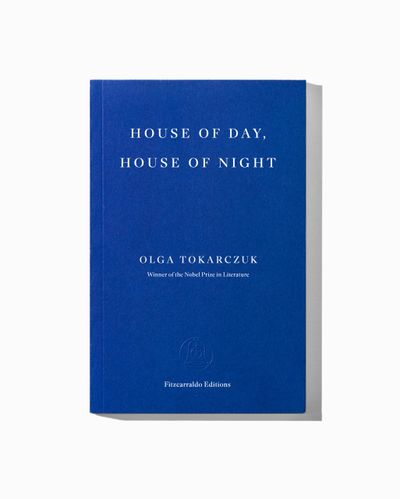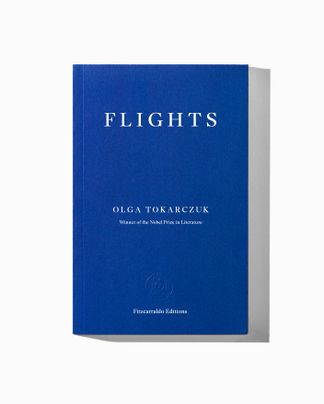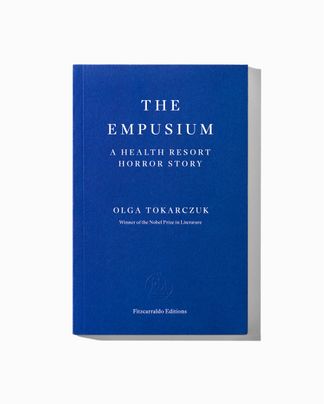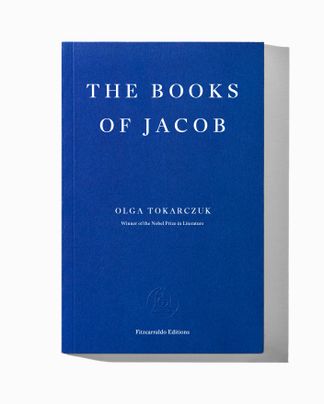A woman settles in a remote Polish village. It has few inhabitants, but it teems with the stories of its living and its dead. There’s the drunk Marek Marek, who discovers that he shares his body with a bird, and Franz Frost, whose nightmares come to him from a newly discovered planet. There’s the man whose death – with one leg on the Polish side, one on the Czech – was an international incident. And there are the Germans who still haunt a region that not long ago they called their own. From the founding of the town to the lives of its saints, these shards piece together not only a history but a cosmology. Another brilliant ‘constellation novel’ in the mode of her International Booker Prize-winning Flights, House of Day, House of Night is a brilliantly imaginative epic novel of a small place by Olga Tokarczuk, one of the most daring and ambitious novelists of our time.

House of Day, House of Night
Translated by Antonia Lloyd-Jones
French paperback with flaps, 336 pages | Audiobook read by Priyanga Burford
Published 11 September 2025
House of Day, House of Night
Translated by Antonia Lloyd-Jones
0
THE DREAM
The first night I had a static dream. I dreamed I was pure looking, pure sight, without a body or a name. I was suspended high above a valley at some undefined point from which I could see everything, or almost everything. I could move around my field of vision, yet remain in the same place. It was as if the world on view below were yielding to me as I looked at it, moving towards me and then away, so that I could see either everything at once or only the tiniest details.
I could see a valley with a house standing right in the middle of it, but it wasn’t my house, or my valley, because nothing belonged to me. I didn’t even belong to myself. There was no such thing as ‘I’. Yet I could see the circular line of the horizon enclosing the valley on all sides. I could see a turbulent, murky stream flowing down between the hills. I could see trees set deep into the ground on mighty feet, like one-legged, immobile creatures. The stillness I saw was only on the surface. Whenever I wished, I could penetrate this surface. Under the bark of the trees I could see rivulets of water, streams of sap flowing to and fro, up and down. Under the roof of the house I could see the bodies of people asleep, and their stillness too was only superficial – their hearts were beating gently, their blood was rippling in their veins, not even their dreams were as they seemed, because I could see what they really were: pulsating fragments of images. None of these sleeping bodies were closer to me, none further away. I was simply looking at them, and in their tangled dream-thoughts I could see myself – this was when I discovered the strange truth, that I was purely vision, without any reflections, judgements or emotions. Then at once I discovered that I could see through time as well, and that just as I could change my point of view in space, so I could change it in time too, as if I were the cursor on a computer screen moving of its own accord, or at least oblivious to the hand that is moving it.
I seemed to dream like this for an eternity. There was no before and no after, no sense of anticipation of anything new, because there was nothing to gain or lose. The night would never end. Nothing was happening. Even time would never change what I could see. I went on looking, not noticing anything new or forgetting anything I had seen.
MARTA
When we moved in three years ago, we spent the whole of the first day inspecting our property. Our gumboots kept sinking into the clay. The earth was red, it stained our hands red, and when we washed them the water ran red. R. examined the trees in the orchard again. They were old, bushy and rambling in all directions. Trees like that probably won’t bear much fruit. The orchard stretched down to the forest and stopped at a dark wall of spruces, standing there like soldiers. In the afternoon the sleet began to fall again. Water collected in pools on the clay-clogged earth, creating streamlets and rills that flowed straight down to the house, seeping into the walls and disappearing somewhere under the foundations. Worried by the constant trickling sound, we went to the cellar with a candle. Water was pouring down the stone steps, washing over the stone floor and flowing out again towards the pond. We realized that the house had been unwisely built on an underground river, and it was too late to do anything about it. The only option was to get used to the relentless murmur of water disturbing our dreams.
There was a second river outside, a stream full of cloudy red water that blindly washed away at the roots of the trees before vanishing into the forest.
From the window of the main room we can see Marta’s house. For the past three years I have wondered who Marta really is. She has told me many different versions of the facts about herself. Every time, she has given a different birth year. For me and R., Marta has only ever existed in the summer; in winter she disappears, like everything else around here. She is small, her hair is white as snow, and some of her teeth are missing. Her skin is wrinkled, dry and warm. I know this because we have sometimes greeted each other with a kiss or an awkward hug, and I have caught her smell – of damp forced to dry out quickly. This smell lingers forever, it can’t be got rid of. Clothing that has got wet in the rain should be washed, my mother used to say, but then she was always doing a lot of unnecessary laundry. She used to take clean, starched sheets out of the wardrobe and throw them in the washing machine, as if not using them made them just as dirty as using them. The smell of damp is usually unpleasant, but on Marta’s clothes and skin it smells nice and familiar. If Marta’s around, everything is in its place.
She came by on our second evening. First we drank tea, then last year’s wild rosehip wine, thick and dark, so sweet it made you feel dizzy at the first gulp. I was unpacking books. Marta held her glass in both hands and watched without curiosity. It occurred to me at the time that perhaps she didn’t know how to read. It was possible, as she was old enough to have missed out on state education. I have seen since that letters simply don’t hold her attention, but I have never asked her about it.
The dogs were excited and kept coming in and out of the house, bringing the scent of winter and wind on their fur. As soon as they had warmed up in front of the kitchen stove, they felt the lure of the garden again. Marta stroked their backs with her long, bony fingers, telling them how beautiful they were. She spoke only to the dogs all evening. I watched her out of the corner of my eye as I arranged the books on wooden shelves. A lamp on the wall lit up the crown of her head with a plume of fine white hairs, tied at the nape of her neck into a little pigtail.
I remember so many things, but I can’t remember the first time I saw Marta. I remember all my first encounters with the people who have subsequently become important to me: I can remember whether the sun was shining and what they were wearing (R.’s funny East German boots, for instance), I can remember how things smelled and tasted, and the texture of the air – whether it was crisp and sharp or cool and smooth as butter. That’s what first impressions are made of – these things get recorded somewhere in a detached, animal part of the brain and can never be forgotten. But I can’t remember my first encounter with Marta.
It must have been early spring – that’s when everything starts here. It must have been in this rugged part of the valley, because Marta never goes further afield on her own. There must have been a smell of water and melted snow, and she must have been wearing that grey cardigan with the loose buttonholes.
I’ve never known much about Marta, only what she has revealed to me herself. I have had to guess most of it, and I’ve been aware of fantasizing about her, of inventing an entire past and present for her. Whenever I’ve asked her to tell me something about herself, about when she was young, about how something that now appears obvious looked then, she has changed the subject, turned to face the window or simply fallen silent, concentrating on chopping up a cabbage or plaiting the hair that she uses to make wigs. It’s not as if she has seemed reluctant to talk, but just as if she simply has nothing to say about herself, as if she has no history. She only likes to talk about other people – some I might have seen once or twice by chance, others I may never have seen at all, and never could, because they lived too long ago. She also likes to talk about people who never actually existed – I have since found proof that Marta likes to invent things – and about the places where she has chosen to plant these people. I’ve known her to talk for hours, until I’ve had enough and find an excuse to interrupt her politely and go home across the green. Sometimes she breaks off these narratives of hers suddenly, for no reason, and doesn’t return to the subject for weeks, until one day out of the blue she says, ‘You remember how I was telling you…’ ‘Yes, I remember.’ ‘Well, what happened next was…’ – and she carries on with some tired old story while I’m racking my brain to remember whom she’s talking about and where she left off. Oddly, it’s never the actual story that comes back to me but the memory of Marta telling it, a small figure in the cardigan with the loose buttonholes, with round shoulders and bony fingers. Did she tell this one while staring at the windscreen as we were driving to Wambierzyce to order planks, or was it the time we were picking chamomile in Bobol’s field? I’ve never been able to reconstruct the story itself, but I always remember the exact scene and circumstances that first rooted it within me, as if these stories were unreal somehow, made up, imagined, imprinted nowhere but in her mind and in mine, blurred by words. Sometimes she breaks off mid-story just as abruptly as she started; a fork falls to the floor with a metallic clang, shattering the last sentence, and the next word comes to a halt on her lips as if she has had to swallow it. Or our neighbour So-and-So comes in without knocking, as he always does, stamping his great boots on the doorstep and trailing water, dew, mud – whatever there is outside – behind him, and once he’s around he makes so much noise that it’s impossible to have any sort of conversation.
Many of the things Marta has told me have not stayed in my memory, but have just left a vague impression, like mustard on the edge of a plate after the food has been eaten. Odd scenes, funny or frightening, and odd images torn out of context have remained – children catching trout from a stream with their bare hands, for instance. I don’t know why I have stored this kind of detail while forgetting the rest of the story. It must have made some sort of sense – it was a story, after all, with a beginning and an end – but I remember nothing but the pips, which my memory, quite rightly, has had to spit out later on.
It’s not that I do nothing but listen. Sometimes I talk to her too. Once, early on, I told her I was afraid of dying, not of death in general, but of the actual moment when I would no longer be able to put anything off till later, and that this fear always comes over me when it’s dark, never in the daytime, and goes on for several awful moments, like an epileptic fit. I immediately felt embarrassed at having made this rather abrupt confession. That time it was me who tried to change the subject.
Marta is not a therapist at heart. She doesn’t keep asking questions, she won’t suddenly abandon the washing up to sit down beside me and pat me on the back. She doesn’t try, as others do, to work out the chronological order of important events by asking, ‘When did it start?’ Even Jesus couldn’t resist the pointless temptation of asking the madman he was about to heal, ‘So when did it start?’ But in fact the most important thing is what’s actually going on here and now, right before your eyes, and questions about the beginning and end tell you nothing worth knowing.
Sometimes I have thought Marta wasn’t listening or that she lacked sensitivity, like a lifeless, cut-down tree, because when I’ve told her something meaningful the kitchen utensils have not stopped clattering, nor have her movements lost any of their mechanical fluency. She has even seemed cruel somehow, not just once or twice but often – like when she fattens up those roosters of hers, then kills and devours them in two days flat each autumn.
I have failed to understand Marta in the past, and I don’t understand her now, whenever I think of her. But why should I? What would I get from uncovering the motives for her behaviour, or the sources of all her tales? What would I gain from her life story, if indeed she has a life story to speak of ? Maybe there are people with no life story, with no past or future, who are different, always in the present.
(…)
‘House of Day, House of Night is full of death, destruction and dreams. Written in 1998, and now translated into English, it is what Tokarczuk calls a “constellation” novel. It is made up of bits of memoir, dream diary, metaphysical musings and sketches of life in Tokarczuk’s adopted home of rural Krajanow, southwest Poland…. House of Day, House of Night is packed with chewy philosophical ideas and spellbinding images.’
— Johanna Thomas-Corr, The Times
‘[A] mosaic of stories, myths, gossip, anecdotes, philosophical reveries and even recipes. Together, these fragments form a history of the region, Tokarczuk’s adopted home in Krajanów in south-west Poland…. Tokarczuk’s reflections are saturated with sensory language that conveys a vivid sense of the landscape and seasonal change – floods, meadow fires and gales. She also displays unnerving prescience in recognizing the latent force of technology and AI.’
— Lucy Popescu, Financial Times
‘What emerges from this cornucopia of curiosities is a rich and pulsating view into life itself, which the narrator views as “beautiful despite the terrible things other people say about it.” It’s a marvel.’
— Publishers Weekly, starred review
‘As a whole, the book is at once simpler and, at the same time, infinitely more complex than it at first appears. An exquisitely constructed, mercurial gem from the Nobel prizewinner.’
— Kirkus, starred review
‘Tokarczuk is an excellent storyteller…. There’s no real plot, of course, and the stories don’t point in any clear direction, yet somehow the novel does achieve a kind of deepening gravity. That’s partly because of the history underlying it, of wars and border disputes, but also because so many of the games Tokarczuk plays pay off.’
— Ben Markovits, New York Times
‘[A] mesmerizing showcase of Tokarczuk’s skills at blending a scrupulous attentiveness to the most humdrum detail of village life in rural Poland with startling forays into the realms of the uncanny…. In what Tokarczuk herself has called a “constellation-novel”, she has brought together her own galaxy of compelling case histories and the result is unfailingly revealing. Her trusted intermediary, Antonia Lloyd-Jones, is the best accomplice Tokarczuk could have wished for in another triumph of the translator’s art.’
— Michael Cronin, Irish Times
‘A magnificent writer.’
— Svetlana Alexievich, 2015 Nobel Prize in Literature laureate
‘A writer on the level of W. G. Sebald.’
— Annie Proulx, author of The Shipping News
‘Olga Tokarczuk is inspired by maps and a perspective from above, which tends to make her microcosmos a mirror of macrocosmos. She constructs her novels in a tension between cultural opposites: nature versus culture, reason versus madness, male versus female, home versus alienation.’
— Nobel Committee for Literature
Praise for The Empusium: A Health Resort Horror Story
‘Tokarczuk’s fiction is built on filtering fragments of the past – people, stories, myths, orthodoxies – through a contemporary lens…. The Empusium is much less a debate of ideas than a study of our perception and the limits of sensory experience. Reality, or rather its elusiveness, preoccupies much of Tokarczuk’s work, which frequently blends genres as a way to get closer to, if not at, what’s true…. Grotesque sexism aside, there is spectacular humour to these scenes as the grandeur of their self-image is so elegantly undermined by the narrator’s description of them…. This too is a novel that in Tokarczuk’s dexterous hands transcends its own limits, further cementing the Nobel laureate as one of the most original storytellers of our age.’
— Matthew Janney, Financial Times
‘Despite the large (if mischievous) debt to The Magic Mountain, Tokarczuk makes this novel all her own with her idiosyncratic blend of registers and genres. She is both a collagist and a doodler, a freewheeling improvisator taking her narrative line for a gloriously erratic walk…. In Lloyd-Jones’s poised translation, Tokarczuk’s puckishness gleams brightly. The best passages in this new novel are weird, lyrical rhapsodies describing the natural world through the all-seeing eyes of those mysteriously plural narrators…. Happily, all the various unlikely strands come together in the closing chapters. The eerily majestic finale is haunting, cathartic and gleeful – a zany confection that could only have come from this unpredictable, unique writer.’
— Claire Lowdon, Times Literary Supplement
‘Deft and disturbing…. In Antonia Lloyd-Jones’s crisp translation, Tokarczuk tells a folk horror story with a deceptively light and knowing tone … elegant and genuinely unsettling.’
— Hari Kunzru, New York Times
Praise for The Books of Jacob
‘[A] visionary novel…. Tokarczuk is wrestling with the biggest philosophical themes: the purpose of life on earth, the nature of religion, the possibility of redemption, the fraught and terrible history of eastern European Jewry. With its formidable insistence on rendering an alien world with as much detail as possible, the novel reminded me at times of Paradise Lost. The vividness with which it’s done is amazing. At a micro-level, she sees things with a poetic freshness…. The Books of Jacob, which is so demanding and yet has so much to say about the issues that rack our times, will be a landmark in the life of any reader with the appetite to tackle it.’
— Marcel Theroux, Guardian
‘The Books of Jacob is a spellbinding epic, one of the great literary achievements of the decade: a poetically brimful recreation of the world of a Jewish false messiah in eighteenth-century Poland, but beyond as well to mystically drawn priests and errant aristocrats. Charged with a sensuous immediacy it’s the kind of hypnotic novel you not so much read as dwell in, and which then, magically, comes to dwell in you.’
— Simon Schama, Financial Times
Praise for Drive Your Plow Over the Bones of the Dead
‘Drive Your Plow is exhilarating in a way that feels fierce and private, almost inarticulable; it’s one of the most existentially refreshing novels I’ve read in a long time.’
— Jia Tolentino, The New Yorker
‘Though the book functions perfectly as noir crime – moving towards a denouement that, for sleight of hand and shock, should draw admiration from the most seasoned Christie devotee – its chief preoccupation is with unanswerable questions of free will versus determinism, and with existential unease…. In Antonia Lloyd-Jones’s translation, the prose is by turns witty and melancholy, and never slips out of that distinctive narrative voice…. [A]n astonishing amalgam of thriller, comedy and political treatise, written by a woman who combines an extraordinary intellect with an anarchic sensibility.’
— Sarah Perry, Guardian
Praise for Flights
‘Flights works like a dream does: with fragmentary trails that add up to a delightful reimagining of the novel itself.’
— Marlon James, author of Moon Witch, Spider King
‘Olga Tokarczuk is a household name in Poland and one of Europe’s major humanist writers, working here in the continental tradition of the “thinking” or essayistic novel. Flights has echoes of W. G. Sebald, Milan Kundera, Danilo Kiš and Dubravka Ugrešić, but Tokarczuk inhabits a rebellious, playful register very much her own…. Flights is a passionate and enchantingly discursive plea for meaningful connectedness, for the acceptance of “fluidity, mobility, illusoriness”. After all, Tokarczuk reminds us, “Barbarians don’t travel. They simply go to destinations or conduct raids.” Hotels on the continent would do well to have a copy of Flights on the bedside table. I can think of no better travel companion in these turbulent, fanatical times.’
— Kapka Kassabova, Guardian
Olga Tokarczuk is the author of nine novels, three short story collections and has been translated into more than fifty languages. Her novel Flights won the 2018 International Booker Prize, in Jennifer Croft’s translation. She is the recipient of the 2018 Nobel Prize in Literature. House of Day, House of Night is her fifth novel to appear in English with Fitzcarraldo Editions.
Antonia Lloyd-Jones has translated works by many of Poland’s leading contemporary novelists and reportage authors, as well as crime fiction, poetry and children’s books. Her translation of Drive Your Plow Over the Bones of the Dead by 2018 Nobel Prize in Literature laureate Olga Tokarczuk was shortlisted for the 2019 International Booker Prize.




